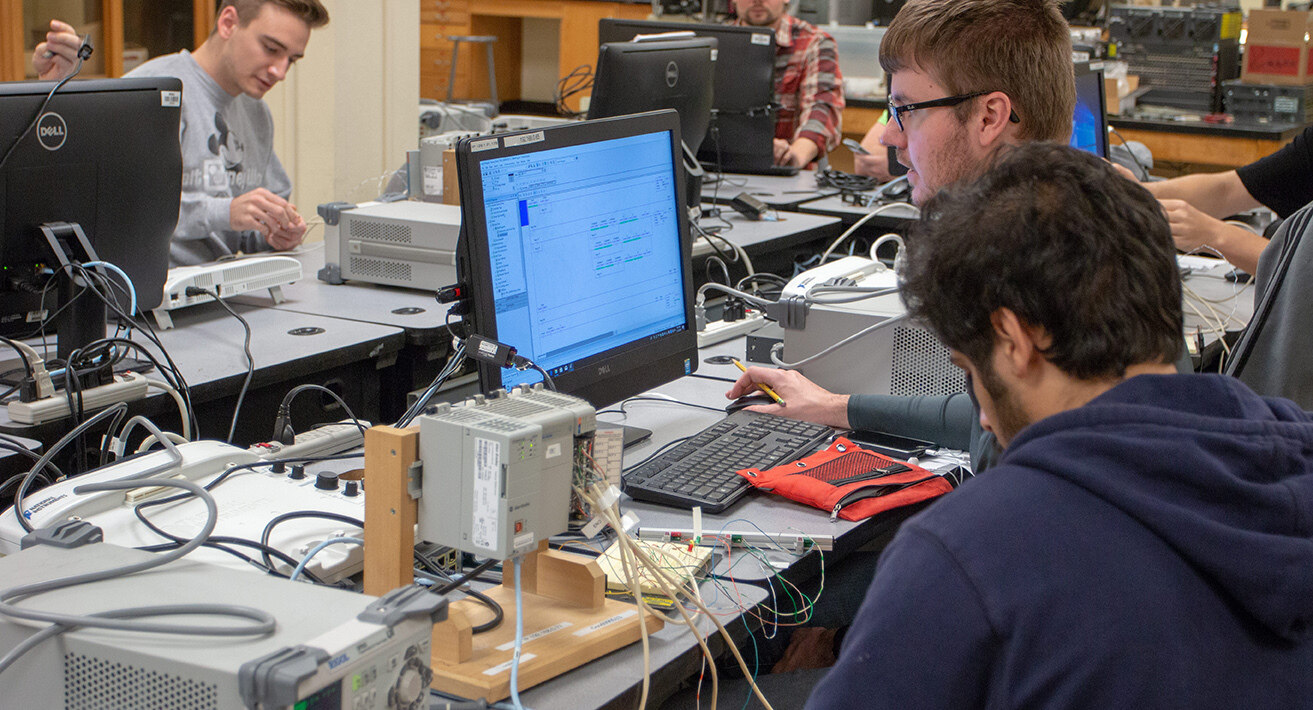
Computer engineering is an ever-evolving field that plays a pivotal role in shaping the modern world. From the development of cutting-edge software to the design of sophisticated hardware, computer engineers are at the forefront of technological innovation. In this article, we will delve into 20 fascinating facts about computer engineering that showcase the depth and breadth of this dynamic discipline. Whether you're a technology enthusiast, a budding engineer, or simply curious about the inner workings of the digital realm, these insights will offer a captivating glimpse into the world of computer engineering. So, let's embark on a journey through the realms of algorithms, circuits, and programming languages as we unravel the intriguing facets of computer engineering.
Key Takeaways:
- Computer engineering blends computer science and electrical engineering to create amazing technology, like the first electronic computer ENIAC and the Internet of Things (IoT).
- Computer engineering pioneers, like Ada Lovelace and Vint Cerf, drive innovation and inspire the next generation of technological trailblazers.
Computer Engineering: A Fascinating Fusion of Technology and Innovation
Computer engineering is a captivating field that seamlessly integrates hardware and software to drive technological advancements. Let's delve into 20 intriguing facts about computer engineering, shedding light on its evolution, impact, and the remarkable individuals who have shaped this dynamic discipline.
Computer Engineering is a Dynamic Blend of Computer Science and Electrical Engineering
This interdisciplinary field combines the principles of computer science and electrical engineering to design and develop computer systems, software, and hardware components.
The First Computer Engineer is Considered to be Ada Lovelace
Ada Lovelace, an English mathematician, is widely regarded as the first computer engineer. Her pioneering work on Charles Babbage's early mechanical general-purpose computer, the Analytical Engine, laid the foundation for modern computer programming.
ENIAC, the First Electronic Computer, Paved the Way for Computer Engineering Advancements
The Electronic Numerical Integrator and Computer (ENIAC), unveiled in 1946, marked a pivotal moment in computer engineering history as the world's first general-purpose electronic digital computer.
The Term "Computer Engineering" Was Coined in the 1960s
During the 1960s, as the demand for professionals with expertise in both hardware and software escalated, the term "computer engineering" emerged to encompass this multidisciplinary domain.
The Evolution of Microprocessors Revolutionized Computer Engineering
The development of microprocessors in the early 1970s fueled a transformative era in computer engineering, enabling the integration of complex computing capabilities into compact electronic devices.
Computer Engineering Empowers the Internet of Things (IoT) Ecosystem
With its emphasis on embedded systems and connectivity, computer engineering plays a pivotal role in driving the proliferation of IoT devices, fostering seamless interactions between physical and digital environments.
The Role of Computer Engineering in Advancing Artificial Intelligence (AI) is Paramount
Computer engineering serves as the bedrock for AI innovation, facilitating the creation of intelligent systems, machine learning algorithms, and neural networks that mimic human cognitive functions.
The Field of Computer Engineering Continues to Redefine the Boundaries of Innovation
From quantum computing and cybersecurity to cloud computing and augmented reality, computer engineering continually pushes the frontiers of technological innovation, shaping the digital landscape.
Computer Engineers are Instrumental in Crafting Cutting-Edge Mobile Technologies
The relentless pursuit of enhanced mobile capabilities, from 5G networks to augmented reality experiences, underscores the pivotal contributions of computer engineers in shaping the mobile technology ecosystem.
The Impact of Computer Engineering Extends Across Diverse Sectors, from Healthcare to Entertainment
Computer engineering's pervasive influence spans diverse industries, driving advancements in medical devices, entertainment systems, autonomous vehicles, and beyond.
Notable Innovators in Computer Engineering Have Revolutionized the Field
Visionary figures such as Vint Cerf, known as one of the "fathers of the Internet," and Grace Hopper, a trailblazing computer scientist, have left an indelible mark on the landscape of computer engineering.
Computer Engineering Nurtures a Culture of Continuous Learning and Adaptation
Given the rapid pace of technological evolution, computer engineers embody a spirit of perpetual learning, embracing new tools, methodologies, and paradigms to stay at the forefront of innovation.
The Ethical and Responsible Use of Technology is a Core Tenet of Computer Engineering
Amidst the technological breakthroughs, computer engineers are committed to upholding ethical standards and ensuring that technological advancements are leveraged for the collective betterment of society.
Computer Engineering Programs Offer Diverse Specializations, Catering to Varied Interests
From embedded systems and robotics to computer networks and cybersecurity, computer engineering programs provide a rich tapestry of specialized pathways for aspiring engineers.
Interdisciplinary Collaboration Amplifies the Impact of Computer Engineering Innovations
The convergence of computer engineering with disciplines such as biomedical engineering, environmental science, and aerospace engineering fosters interdisciplinary synergy, spurring groundbreaking innovations.
Computer Engineering Encompasses a Spectrum of Career Opportunities
Graduates in computer engineering embark on diverse career paths, spanning roles in software development, hardware design, systems architecture, cybersecurity, and technological consultancy.
The Pursuit of Excellence Drives Ongoing Research and Development in Computer Engineering
The quest for innovation and excellence propels ongoing research endeavors in computer engineering, fueling breakthroughs in areas such as quantum computing, bioinformatics, and sustainable technology solutions.
The Future of Computer Engineering Promises Unprecedented Technological Marvels
As computer engineering continues to evolve, the horizon brims with possibilities, from quantum supremacy and brain-computer interfaces to immersive virtual environments and beyond.
Computer Engineering Inspires the Next Generation of Innovators and Technological Trailblazers
By igniting curiosity and nurturing a passion for problem-solving, computer engineering cultivates a new wave of innovators poised to shape the future of technology and drive societal progress.
Computer engineering stands as a captivating testament to human ingenuity, weaving together the realms of hardware and software to sculpt the technological tapestry that defines our modern world. As this dynamic field propels us into an era of unprecedented innovation, the fusion of computer science and electrical engineering continues to underpin the fabric of our digital future.
Conclusion
In conclusion, computer engineering is a dynamic and ever-evolving field that plays a pivotal role in shaping our modern world. From developing cutting-edge technologies to optimizing existing systems, computer engineers are at the forefront of innovation. The interdisciplinary nature of computer engineering allows professionals to explore diverse areas, including hardware design, software development, and cybersecurity. As the demand for technological advancements continues to surge, the significance of computer engineering in driving progress across industries cannot be overstated.
FAQs
What are the primary responsibilities of computer engineers?Computer engineers are tasked with designing and developing computer hardware and software systems, conducting thorough testing and analysis, and ensuring the seamless integration of technology into various applications.
What career opportunities are available for individuals with a degree in computer engineering?Graduates in computer engineering can pursue diverse career paths, including roles in software development, network engineering, cybersecurity, embedded systems design, and artificial intelligence research. The versatility of computer engineering opens doors to opportunities across industries, from technology firms to healthcare and finance sectors.
Intrigued by the captivating world of computer engineering? Continue your exploration with our article on Chuck Hull, the inventor of 3D printing. Hull's groundbreaking work revolutionized manufacturing, paving the way for rapid prototyping and customized production. His innovative spirit embodies the essence of computer engineering, where creativity and technical expertise converge to shape our future. Dive into Hull's remarkable journey and uncover the fascinating facts behind his transformative invention. Get ready to be inspired by the power of innovation and the limitless possibilities that computer engineering holds.
Was this page helpful?
Our commitment to delivering trustworthy and engaging content is at the heart of what we do. Each fact on our site is contributed by real users like you, bringing a wealth of diverse insights and information. To ensure the highest standards of accuracy and reliability, our dedicated editors meticulously review each submission. This process guarantees that the facts we share are not only fascinating but also credible. Trust in our commitment to quality and authenticity as you explore and learn with us.


